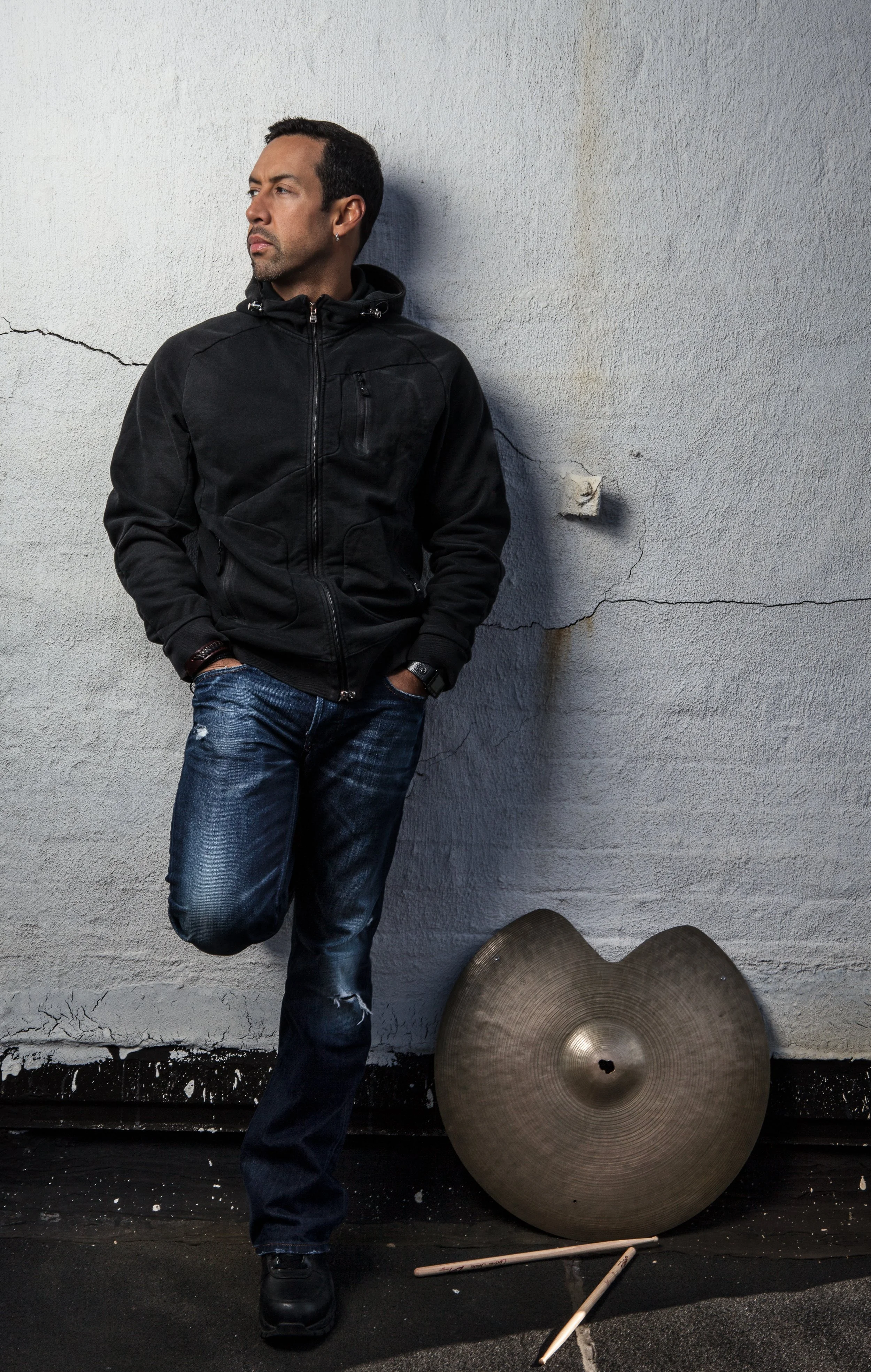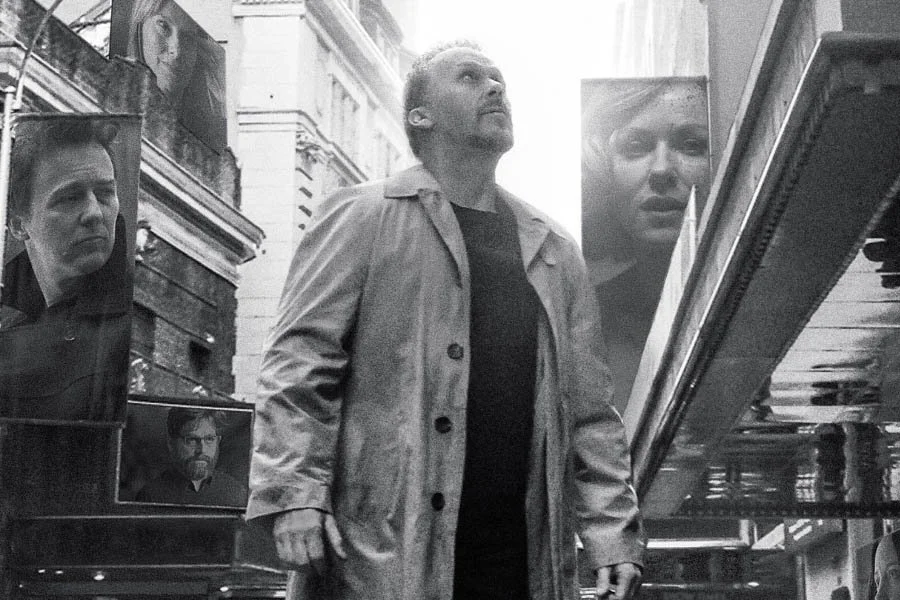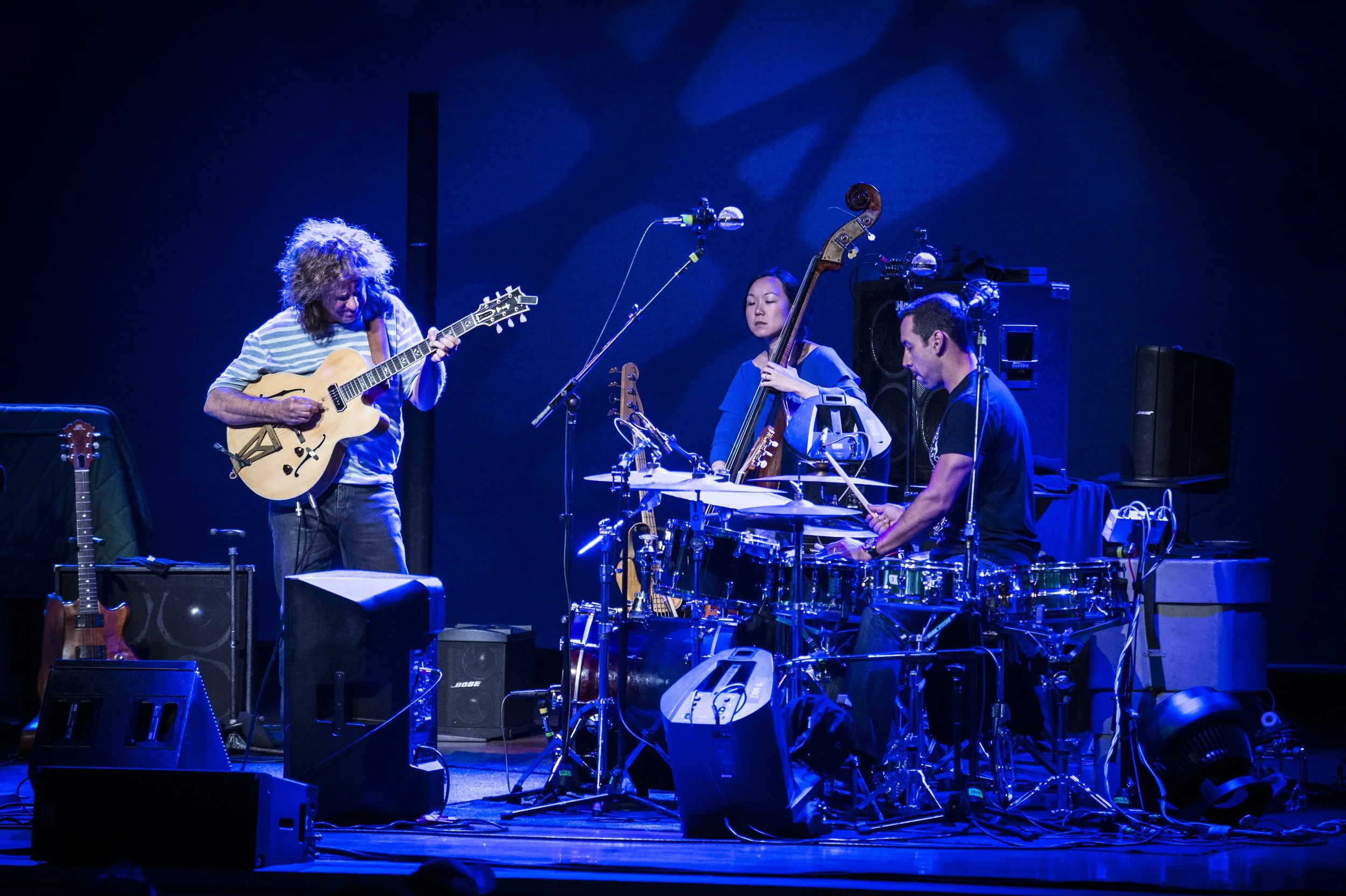By Donald Liebenson
One of the Motion Picture Academy’s most grievous snubs was denying Antonio Sánchez even an Oscar nomination for his percussive score for Alejandro González Iñárritu’s Birdman, which went on to win Oscars in 2015 for Best Picture, Director, Screenplay, and Cinematography. The mostly drum score was the propulsive accompaniment to the film, which seemingly unfolded in one unbroken take.
Charles Fox, the chair of the Academy’s music branch executive committee, informed Sánchez that “the drum score is highly effective in the places in the film where it is used. However, the fact that the film also contains over a half an hour of non-original (mostly classical) music cues that are featured very prominently in numerous pivotal moments in the film made it difficult for the committee to accept your submission as an eligible score.”
Yet when watching Birdman, what is the takeaway from the soundtrack—the snatches of classical music or the drums?
Ravinia attendees can ponder this when Sánchez performs the score live during a 10th-anniversary screening of Birdman on June 26.
Mexico City native Sánchez, a four-time Grammy-winner, is perhaps best known for his decades-long association with Pat Metheny. He learned to play drums at the age of 5, and in his early teens, performed professionally in a variety of music genres. After graduating magna cum laude in Jazz Studies at the New England Conservatory, in 1999 Sánchez moved to New York City, where, if you can make it there ... well, you know.
Birdman was his first film score. He has since scored the TV series Get Shorty and is at work on Seth Rogan’s upcoming AppleTV+ series The Studio. Performing Birdman live has been a revelatory and radical experience for him, he told Ravinia in a phone interview from his home in Barcelona.
To hear him tell it, his collaboration with Iñárritu seemed almost fated. And as with many future musicians, it all began with rock and roll radio.
(This interview has been edited for length and clarity.)
What was your radio station growing up in Mexico?
96.9! Surreptitiously, [future director] Alejandro González Iñárritu was one of the DJs. He’s an avid music lover and connoisseur. That’s why we connected so well. The first time I heard Pat Metheny was on his nightly radio show, Magic Night. I heard [Metheny’s] “Last Train Home.” Back then, I was listening to The Police, Rush, British rock. All of a sudden, this tune comes on and I’m like, “This is so cool, what is this?” That’s when I started checking out the Pat Metheny Group. I met Alejandro in 2005 after a show I was playing in Los Angeles with Pat. The full circle aspect of this whole Birdman thing has been astonishing.
You began playing drums at age 5. What about the drums spoke to you?
I usually say that I didn’t pick the drums, the drums picked me. I had no choice in the matter. I saw a drum set close up in my uncle’s girlfriend’s house. She had a brother who set up his drums in the living room. It looked awesome, like a space ship. He played and the sheer sound took over me. I started taking lessons and I never looked back.
I’m a little older than you. Growing up, my favorite drummer was Ginger Baker. What drummers influenced you?
Ginger Baker was one of them. My mom loved Cream, and she also listened to Ginger Baker’s later band, Air Force. She said I would be rolling and tumbling in her womb whenever she played that record.
You must have been blown away when Birdman was pitched to you. It would be like if Steven Spielberg pitched Toots Thielemans on an all-harmonica score.
It was 10 years after we met. I got a call from Alejandro. He said he was working on a dark comedy. He reflected that comedy and rhythm go hand in hand and remembered a drum solo I played that night he saw me in Los Angeles. He said, “Do you want to do it?” and I said, “Yeah of course.” It happened just like that, just one phone call.
Was composing for the screen on your to-do list?
Not at all. I was so into performing live and touring. I was composing, but for my own projects. I had studied classical music in Mexico, so I was not afraid of composition, but it was not on my radar.
What was the process of collaborating with Alejandro?
In the beginning, I approached it in an over-analytical way. I was just trying to think, “What would John Williams or Hans Zimmer do?”—but on the drums. My original intention was to create rhythmic themes for the different characters, but it became clear that the drums were more about Michael Keaton’s character. The drums were the inner voices in his head. It turned out what Alejandro wanted me to do was improvise, be in the moment. That was something I could do.
Did you have a say in which takes would be used for the finished film?
We did as many takes as possible. Every time Alejandro felt we had it, he said let’s move on. He had the final say.
That sounds like it would be the key difference between working in the film world and the music world.
They couldn’t be more different. When you’re composing for film, everybody has opinions on what the music should be. That part is hard sometimes when they are nitpicking at something you really believe in. But at the end of the day, you’re an employee and you have to satisfy the needs of the employer. In the music world, you are on your own. If you flunk, it’s your fault; if you succeed, it’s because you did something cool. But the money is way better in the film world. [Laughs]
What was it like seeing Birdman for the first time with an audience?
I was on tour in Asia when the movie opened. I started seeing reviews that were very favorable. I have to be honest, the last thing I saw before I left was only the rough cut of the movie with my original demos. It had no credits, color correction; the editing wasn’t done yet; it didn’t look like one continuous shot. And I saw it on a little TV. I thought the movie was interesting, but it didn’t hit me at all. I came back from the tour and my wife and I went to this movie theater in Chelsea, NY, at 2:00 p.m. There were five or six people in the audience. The movie started and the first thing I hear is my voice in Spanish. Then all of a sudden, boom, the screen goes dark the drums start and the credits start. I was blown away. I started crying. It was so impactful.
When an orchestra performs live for a movie screening, it must be timed perfectly and played note-for-note. How much does improvisation continue to play in your performance of the Birdman score?
In the beginning, the movie would start and I would play, and I would end when the credits ended. Then I started thinking that this was a missed opportunity. I thought people would be interested in knowing what our process was. I began to introduce the film with a five-to-ten minute explanation of how someone who had absolutely no track record as a film scorer ended up doing this movie. Later, I read a review that said the experience was cool, but he wished I played more. I started adding a drum solo at the end of the movie. I realized I had a captive audience, so I just kept going. I had a theater all to myself, which never happens when you’re a drummer. [Laughs] So, I started really exploring the space with my drums. I really enjoy it. Back then I had no time to think, I was just doing. Now, I’m doing the version I would do if I had the movie to score now. I do know it so intimately. This is more a conversation what I’m doing now.
Sánchez playing Ravinia in 2017 with Pat Metheny and bassist (and Ravinia Steans Music Institute alum) Linda May Han Oh
Your collaboration with Pat Metheny has lasted longer than some marriages. What is at the core of your artistic relationship?
Pat is a visionary, and the fact that I was not exclusively a jazz drummer, that my mind was wide-open musically and was curious about different ways of approaching the drums enticed him. I wanted to be the ultimate sideman. He would ask for my opinion because I spent so much time with him on different projects. I was virtually his only drummer on every project he did from the 2000s until very recently. He has still a lot going on, he’s touring like crazy. I’m doing my own thing and I cannot just be leaving for months on end, so we’re talking a little break, but there will a chance to play again. I love him.
Music education is one of Ravinia’s core missions. What advice would you have for music students to make the most of these years?
What you put in is what you’re going to get out in a few years. College may be a lot of fun, but if you slack off, if you don’t consider what this is going to do for you, you can be wasting a bit of your time. I was so motivated to build something during those years so I could take advantage of it later. It was a very important period for me. It was hard for me to get to the States as a Mexican citizen—to do it legally, pay for school, get scholarships, it was incredibly complicated. I left my family, I left my country because I wanted to do this thing that I love. I was so determined to stand out. I remember thinking my first semester that we were all the same then, bur in four years we would all be at different levels, and that started then.
I have to ask: Do you have a favorite drummer joke?
[Laughs] I usually start my masterclasses and clinics by asking, “How many drummers in the house?” If there are 100 people, 90 will raise their hands. My second question is, “How many musicians are there?” The confusion on their faces is so funny. The point being that you need to think of yourself as a musician, not just as a drummer. And I go from there.
I took this from Birdman’s opening quote: Are getting what you want out of this life?
That’s a good question. Being ambitious and driven can be a blessing and a curse. This life has become so fast-paced. Last week, I was in New York doing my Birdman show, then I performed at Carnegie Hall. The next day, my wife and I flew back to Spain, landed four hours late, went to the house, slept for an hour, and then we went to the main square in Barcelona and I played with my other band, Bad Hombre, in front of a couple of thousand people. Then, the next day I went to my studio to start scoring again. I haven’t had time to think, “Wow, Carnegie Hall was amazing.” That’s the problem this life usually brings. There are so many things you want to do. I feel incredibly privileged.
_________
Donald Liebenson is a Chicago-based entertainment writer. His work has appeared in the Chicago Tribune, Chicago Sun-Times, Los Angeles Times, and on RogerEbert.com. The first Ravinia concert he attended without his parents was Procol Harum in 1970.





